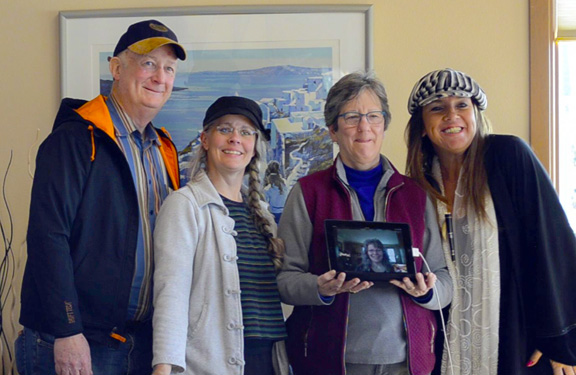Spring 2014 - Resiliency Reader Index
Featured Articles include: Why Trust Change: 5 Tips for Safe Passage • MetaResilience and the Experience of Adversity • Warrior Resilience Training in Operation Iraqi Freedom (Article Review) • Resiliency Center Retreat Summary • Events and Resources. • Read the emailed version of Resiliency Reader.
ASRC Board Retreat 2014

Retreat Participants: Glen, Kristin, Molly, Claudia and Michelle (on screen)

Quantum Assessment review session: Claudia, Glen and Molly

Claudia connecting with Michelle

Our view of Haystack Rock
On the weekend of March 21-23, ASRC Director Molly Siebert gathered the ASRC Board and invited Resilitators and others to attend a weekend retreat in the Oregon coastal town of Cannon Beach. The purpose was to jump start some long-term planning for the ASRC. We had five participants, four on-site—Director Molly Siebert, Lead Resilitator Glen Fahs, Resilitator Claudia Riecken from Brazil, and Al's niece and longtime assistant Kristin Pintarich—plus one participating via video conference: Michelle Atlas in New York.
The questions put forth by Molly included:
- What is ASRC’s mission statement?
- How would you describe the purpose of ASRC and the team? (Core Values/Principles)
- What goals and objectives do you envision for ASRC and the team?
- How will we know these are accomplished?
- What are our strengths and significant events
- Actions/tasks to take to improve. (Action Pan.)
- What relationships to create?
- How to build agreements/trust?
- List your top two needs from ASRC.
- What is our 5-year Vision plan?
Good progress was made on five of the ten items (see bolded items). Items not discussed will be revisited in the future. Participants also took the Quantum Assessment that Claudia developed and spent time discussing their results. (Choose the US flag at the top of the page for the English version of the website)
Action Plan
Some items for our action plan include:
- Develop additional online "tools" for public usage, including the Quantum Assessment
- Double the number of newsletter subscribers
- Market our center, Resilitators, and expertise
- Grow our network
- Reach out to organizations needing resiliency training
Mission Statement
After several rounds of discussion, we settled on:
Developing human resiliency around the world to master change, thrive under pressure and bounce back from setbacks
Submit your thoughts!
This email address is being protected from spambots. You need JavaScript enabled to view it. with what and how we can best serve you.
Meta Resilience and the Experience of Adversity
by Paul Mooney, Doctoral Candidate, Middlesex University, London
Read the complete article (4 page PDF): "Meta Resilience and Experience of Adversity,”
by Paul Mooney
Transformational Burnout is the guided experience of embracing Burnout to release Resilience. The transformation that takes place is from an old perception of the self which is struggling with coping in the present, to a new realised self which has ample resources to relish the ups and downs of life. This process of change leads to transformational learning which allows one to access enhanced and transcendent leadership capabilities in a personal, group and organisational context. READ MORE...
Contributor Paul Mooney lives in Woodmead, Johannesburg, South Africa. He is a Social Entrepreneur, Thought Leader & Practitioner who speaks and teaches on Transformational Burnout, Personal Group & Organizational Resilience, Engagement, and Leadership
Email: This email address is being protected from spambots. You need JavaScript enabled to view it.
Phone: +27 711 059 930
Web: http://meta-resilience.ning.com
Skype: Resilience4Enterprise
Twitter: ResilienceGuy
Why Trust Change? 5 Tips for Safe Passage
By Michelle Atlas, Certified Resiliency Facilitator
www.trust-change.com
"In the end only three things matter: how much you loved, how gently you lived and how gracefully you let go of things not meant for you." ~ Buddha
It seems, as we enter midlife (which I consider anywhere between approximately 40 and 65) we may find ourselves faced with any number of highly sobering challenges, personally or professionally. Perhaps it's the first time you've experienced the death of a loved one, a radical job change or a sudden and unexpected shift in circumstance that leaves you re-assessing your values, life direction and what matters most to you.
The challenge
When unanticipated changes come down the pike, we may find ourselves flooded with any number of challenging emotions including fear, anger, numbness, sadness, frustration, resentment.
The good news
Science tells us that although our first response may be to resist change, we are absolutely, innately hardwired to grow stronger and more life-competent through change and challenge!
The opportunity
It is in our capacity to trust into the unknown, "the land of I don't know,"during tough times, that the greatest potential to shift the way we see and experience our lives exists. By refraining from bandaging our wounds with quick fixes, we allow our mind, our heart and our body to re-pattern and reorganize itself around values and goals that will support us in achieving our next level of excellence in life.
The mindset
Science also tells us, that the inherent potential to use your greatest hardship to become your best self, must be self-directed. The first step in creating the life or the workplace we desire is shifting from a victim mindset to one of proactive self-compassion and self-accountability. There are many proven practices and strategies to help us journey from hardship, through the unknown and toward the multitude of new possibilities that await us.
5 tips for safe passage:
-
Take time to face into specific losses. Ask yourself what is actually ending, what will not be continuing, or what can you now stop doing or focusing on?
Proactive coping step: Processing this via journaling or conversation with a trusted friend or coach will encourage the release of grief and begin to gently carry you from the familiar shore, into the waters of unprecedented possibility. -
What's new? Whatever has ended, truly does make space for something new. While honoring what has passed, cultivate the eyes to see what gifts may now be available to you.
Proactive coping step: Ask yourself, what one opportunity exists right now, that did not exist before this change/loss? -
Patience makes perfect: Transition often takes longer than we expect. Allowing for the many phases of adjustment is well worth the wait. The internal process that leads to lasting and authentic change may be invisible, but is often well underway, just when our patience is most tested! It is in the space where the past begins to lose its grip and the future has not yet taken hold, that there is tremendous creative potential.
Proactive coping step: Use this time to dream freely and boldly regarding innovative possibilities that you have always wanted to achieve or experience. -
Stay connected: Allow your challenges to soften your boundaries. Challenge yourself to reach out to someone in your world you may not have shared very much with in the past. You may be surprised at the unanticipated friendships that become available to you.
Proactive coping step: What one person could you reach out to as a supportive resource this week, beyond your familiar circle? -
To thine own self be true: The best formula for navigating the waters of uncertainty will be unique to each person. Some people will crave more contemplative time and some will benefit from more frequent companionship. Some will become more active and others will have a great need to slow down. Use your time of change, to call forth the kind of self-compassion and attentiveness to your true needs that you have probably gladly provided to friends and loved ones much of your life.
Proactive coping step: What one intentional act of self-nurturance can you gift yourself today?
Michelle Atlas, is an ICF Credentialed Coach, a Newfield Certified Coach and a Certified Resiliency Facilitator with over 20 years of experience helping people successfully navigate transition and stand in their value, so they can live lives that reflect what they care about most. With clients including the US Military, the Food & Drug Administration, National Institutes of Health and many private individuals, she is recognized for her ability to help people strengthen their innate resilience and bring their heartfelt desires to fruition in the domains of work, relationships and money.
trust-change.com
